2020年大学英语六级作文范文:学术造假现象
- 格式:docx
- 大小:37.30 KB
- 文档页数:2

学术作假英文作文Academic fraud is a serious issue that undermines the integrity of the education system. It involves dishonest practices such as plagiarism, fabrication of data, and ghostwriting. These actions not only deceive the academic community but also hinder the progress of knowledge and innovation. Academic fraud is a betrayal of trust and undermines the credibility of both the individual and the institution.Plagiarism, for instance, is a common form of academic fraud. It involves using someone else's work without giving proper credit. This can range from copying and pasting entire paragraphs from a source to paraphrasing without acknowledging the original author. Plagiarism not only robs the original author of their intellectual property but also prevents the plagiarizer from developing their own critical thinking and research skills.Fabrication of data is another form of academic fraudthat is equally damaging. This involves falsifying research findings or manipulating data to fit a desired outcome. Fabricated data not only misleads the academic community but also wastes valuable time and resources. It can lead to false conclusions and hinder scientific progress, as other researchers may base their work on false information.Ghostwriting is a deceptive practice in which someone else writes a paper or article on behalf of the credited author. This is often done to enhance the perceived credibility of the author or to meet publication requirements. Ghostwriting not only undermines the author's integrity but also distorts the academic record. It prevents the true author from receiving proper recognition for their work and can lead to a skewed understanding of the field.Academic fraud not only harms individuals and institutions but also has broader societal implications. It erodes public trust in the education system and undermines the value of academic achievements. It creates an unfair advantage for those who engage in fraudulent practices,depriving deserving individuals of opportunities. Moreover, it perpetuates a culture of dishonesty and undermines the ethical foundations of academia.To combat academic fraud, institutions must prioritize integrity and promote a culture of academic honesty. This can be achieved through educating students about the importance of ethical conduct, providing resources for proper citation and research techniques, and implementing strict consequences for those who engage in fraudulent practices. Additionally, fostering an environment that values originality and critical thinking can discourage the temptation to cheat.In conclusion, academic fraud is a serious issue that undermines the integrity of the education system. It involves dishonest practices such as plagiarism,fabrication of data, and ghostwriting. These actions not only deceive the academic community but also hinder the progress of knowledge and innovation. To combat academic fraud, institutions must prioritize integrity and promote a culture of academic honesty.。
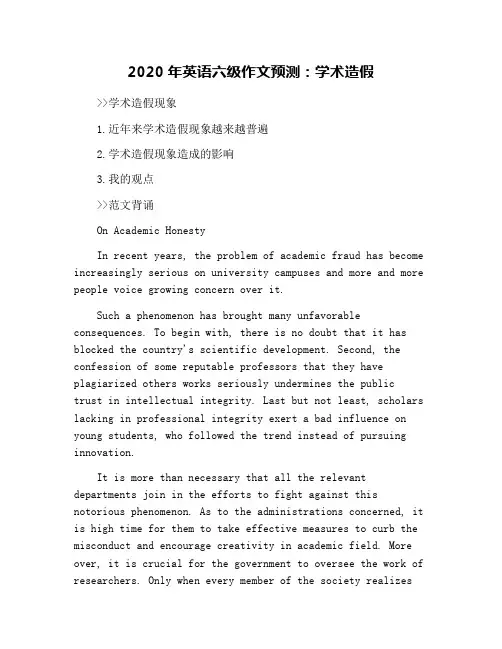
2020年英语六级作文预测:学术造假>>学术造假现象1.近年来学术造假现象越来越普遍2.学术造假现象造成的影响3.我的观点>>范文背诵On Academic HonestyIn recent years, the problem of academic fraud has become increasingly serious on university campuses and more and more people voice growing concern over it.Such a phenomenon has brought many unfavorable consequences. To begin with, there is no doubt that it has blocked the country's scientific development. Second, the confession of some reputable professors that they have plagiarized others works seriously undermines the publictrust in intellectual integrity. Last but not least, scholars lacking in professional integrity exert a bad influence on young students, who followed the trend instead of pursuing innovation.It is more than necessary that all the relevant departments join in the efforts to fight against this notorious phenomenon. As to the administrations concerned, it is high time for them to take effective measures to curb the misconduct and encourage creativity in academic field. More over, it is crucial for the government to oversee the work of researchers. Only when every member of the society realizesthe harm brought by academic dishonesty can we put an end to the abominable practice.>>亮点词汇①blockv.防碍②confessionn.承认,坦白③plagiarizev.抄袭,剽窃④underminev.破坏,损害⑤exert a bad influence on对……造成不好的影响⑥overseev.监管⑦abominablea.令人憎恶的,恶劣的>>文章点评第一段点明文章论述的问题,即学术上的弄虚作假,同时指出这个问题日趋严重,引起越来越多的注重。
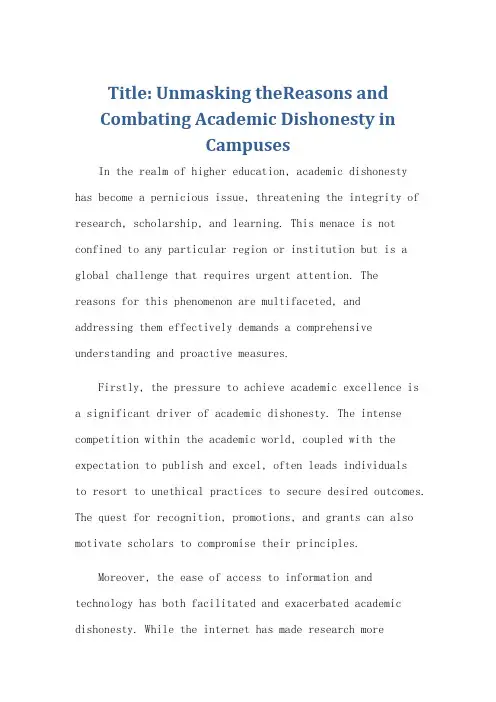
Title: Unmasking theReasons andCombating Academic Dishonesty inCampusesIn the realm of higher education, academic dishonesty has become a pernicious issue, threatening the integrity of research, scholarship, and learning. This menace is not confined to any particular region or institution but is a global challenge that requires urgent attention. Thereasons for this phenomenon are multifaceted, andaddressing them effectively demands a comprehensive understanding and proactive measures.Firstly, the pressure to achieve academic excellence is a significant driver of academic dishonesty. The intense competition within the academic world, coupled with the expectation to publish and excel, often leads individualsto resort to unethical practices to secure desired outcomes. The quest for recognition, promotions, and grants can also motivate scholars to compromise their principles.Moreover, the ease of access to information and technology has both facilitated and exacerbated academic dishonesty. While the internet has made research moreconvenient, it has also provided opportunities for plagiarism, fabrication of data, and other unethical practices. The anonymous nature of the digital worldfurther compounds this issue, as individuals may feel less accountable for their actions.Cultural and institutional factors also play a role. In some cultures, success is equated with achievement, and any means necessary to secure it are considered justifiable. Similarly, institutional cultures that prioritize quantity over quality, or that reward short-term gains over long-term sustainability, can foster an environment conducive to academic dishonesty.To combat this menace, a multifaceted approach is necessary. Firstly, institutions must establish a strong ethical framework that promotes honesty, integrity, and responsible conduct in research. This should include clear guidelines on acceptable academic practices, as well as mechanisms for reporting and investigating instances of dishonesty.Secondly, education is crucial. Both undergraduate and graduate students should be educated on the importance ofacademic integrity and the consequences of dishonesty from the outset of their academic careers. This should include sessions on ethical research practices, plagiarism, and citation guidelines.Thirdly, institutions should create an enabling environment that fosters critical thinking, creativity, and innovation. By providing resources, encouragement, and support, institutions can help scholars pursue their research interests ethically and productively. This approach not only discourages dishonesty but alsocultivates a culture of excellence and innovation.Lastly, stringent enforcement of sanctions is essential. When instances of academic dishonesty are discovered, institutions must take appropriate disciplinary action to ensure that the perpetrators are held accountable. This sends a clear message that such behavior is unacceptableand deterrents others from following suit.In conclusion, academic dishonesty is a complex issue that requires a concerted effort from all stakeholders to address. By understanding the root causes and implementingtargeted strategies, institutions can create an environment that fosters academic excellence, integrity, and innovation. **校园学术造假的原因及对策**在高等教育领域,学术不端已成为一个严重影响学术诚信的问题。
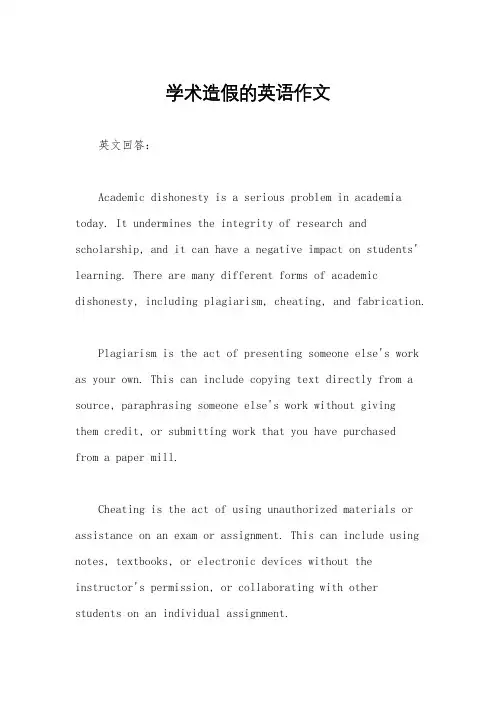
学术造假的英语作文英文回答:Academic dishonesty is a serious problem in academia today. It undermines the integrity of research and scholarship, and it can have a negative impact on students' learning. There are many different forms of academic dishonesty, including plagiarism, cheating, and fabrication.Plagiarism is the act of presenting someone else's work as your own. This can include copying text directly from a source, paraphrasing someone else's work without givingthem credit, or submitting work that you have purchasedfrom a paper mill.Cheating is the act of using unauthorized materials or assistance on an exam or assignment. This can include using notes, textbooks, or electronic devices without theinstructor's permission, or collaborating with other students on an individual assignment.Fabrication is the act of creating data or information that is not true. This can include falsifying research results, making up quotes, or submitting forged documents.Academic dishonesty is a violation of ethical and professional standards. It can have serious consequences, including failing a class, being suspended from school, or even being expelled. It can also damage your reputation and make it difficult to find a job.If you are caught committing academic dishonesty, you should take responsibility for your actions. Be honest with your instructor and explain why you did what you did. You should also be willing to accept the consequences of your actions.There are many things you can do to avoid academic dishonesty. First, be sure to understand the rules and expectations for your class. Second, start your assignments early and give yourself plenty of time to complete them. Third, cite your sources carefully and give credit to theoriginal authors. Finally, be honest with yourself and your instructors about your academic work.中文回答:学术造假是当今学术界一个严重的问题。
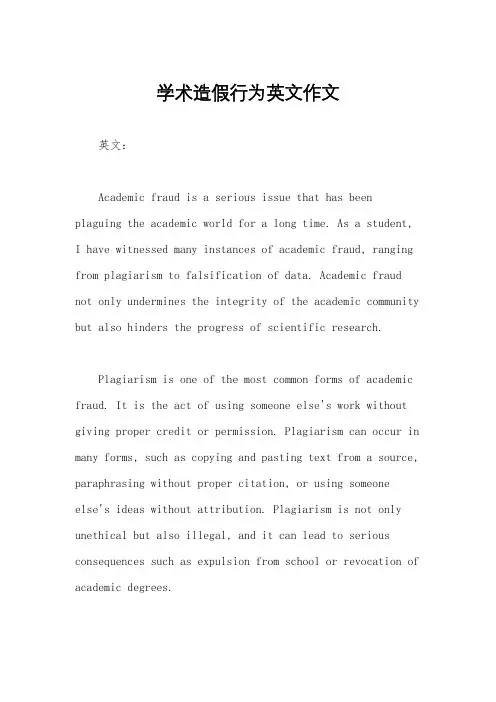
学术造假行为英文作文英文:Academic fraud is a serious issue that has been plaguing the academic world for a long time. As a student, I have witnessed many instances of academic fraud, ranging from plagiarism to falsification of data. Academic fraud not only undermines the integrity of the academic community but also hinders the progress of scientific research.Plagiarism is one of the most common forms of academic fraud. It is the act of using someone else's work without giving proper credit or permission. Plagiarism can occur in many forms, such as copying and pasting text from a source, paraphrasing without proper citation, or using someoneelse's ideas without attribution. Plagiarism is not only unethical but also illegal, and it can lead to serious consequences such as expulsion from school or revocation of academic degrees.Another form of academic fraud is the falsification of data. This occurs when researchers manipulate or fabricate data to support their hypotheses or conclusions.Falsification of data is a serious offense, as it can leadto incorrect conclusions and harm the progress ofscientific research. It can also lead to legal consequences, such as fines or imprisonment.Academic fraud is not limited to students and researchers. It can also occur at the institutional level, such as when universities or academic journals engage in fraudulent practices to boost their rankings or reputation. This can include the manipulation of data or the acceptance of fraudulent research papers.In conclusion, academic fraud is a serious issue that needs to be addressed. It undermines the integrity of the academic community and hinders the progress of scientific research. As students and researchers, we need to upholdthe highest standards of academic integrity and report any instances of academic fraud that we encounter.中文:学术造假是一个长期以来困扰学术界的严重问题。
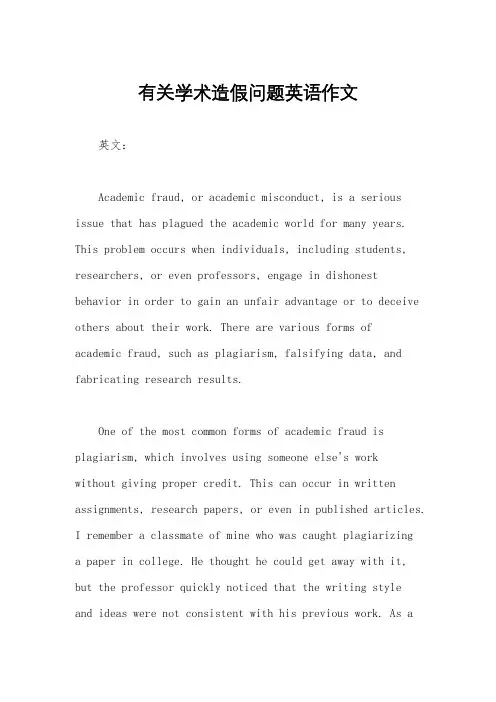
有关学术造假问题英语作文英文:Academic fraud, or academic misconduct, is a serious issue that has plagued the academic world for many years. This problem occurs when individuals, including students, researchers, or even professors, engage in dishonest behavior in order to gain an unfair advantage or to deceive others about their work. There are various forms of academic fraud, such as plagiarism, falsifying data, and fabricating research results.One of the most common forms of academic fraud is plagiarism, which involves using someone else's workwithout giving proper credit. This can occur in written assignments, research papers, or even in published articles.I remember a classmate of mine who was caught plagiarizinga paper in college. He thought he could get away with it, but the professor quickly noticed that the writing styleand ideas were not consistent with his previous work. As aresult, he failed the assignment and was given a warning by the university.Another example of academic fraud is falsifying data in research. This can occur when a researcher manipulates or fabricates data in order to support their hypotheses or conclusions. I once read about a high-profile case where a prominent scientist was found to have falsified data in a published study. This not only damaged the reputation of the researcher, but also had serious implications for the scientific community as a whole.It is important to address academic fraud because it undermines the integrity and credibility of the academic community. When individuals engage in dishonest behavior, it not only affects their own reputation, but also the reputation of the institution they are affiliated with. Furthermore, it can have serious consequences for the advancement of knowledge and the trustworthiness of academic research.中文:学术造假是一个长期困扰学术界的严重问题。
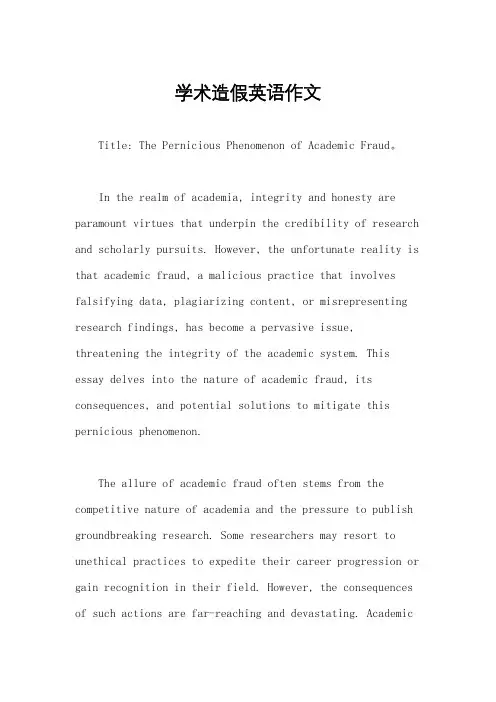
学术造假英语作文Title: The Pernicious Phenomenon of Academic Fraud。
In the realm of academia, integrity and honesty are paramount virtues that underpin the credibility of research and scholarly pursuits. However, the unfortunate reality is that academic fraud, a malicious practice that involves falsifying data, plagiarizing content, or misrepresenting research findings, has become a pervasive issue, threatening the integrity of the academic system. This essay delves into the nature of academic fraud, its consequences, and potential solutions to mitigate this pernicious phenomenon.The allure of academic fraud often stems from the competitive nature of academia and the pressure to publish groundbreaking research. Some researchers may resort to unethical practices to expedite their career progression or gain recognition in their field. However, the consequences of such actions are far-reaching and devastating. Academicfraud undermines the credibility of research, jeopardizes the reputation of institutions, and robs genuine researchers of their due recognition. Moreover, it erodes public trust in science and academia, impeding the advancement of knowledge and society.One of the most distressing aspects of academic fraudis the harm it inflicts on the victims. Innocent researchers who have diligently conducted their work may be overshadowed by fraudulent claims, leading to a loss of funding, opportunities, and credibility. Students, too, suffer when they encounter fraudulent professors or advisors, as their educational journey is compromised by flawed teaching and misrepresentation of facts.To combat academic fraud, a multifaceted approach is necessary. Firstly, institutions must establish robust systems of ethical oversight and enforcement. This includes establishing clear guidelines for research conduct, conducting regular audits of research outputs, and imposing strict sanctions on those who violate ethical standards. Secondly, education on research ethics must be integratedinto academic curricula, fostering a culture of integrity and honesty from the outset. Additionally, open access to research data and methodologies can promote transparency and facilitate the detection of fraudulent practices.Moreover, the academic community must foster a culture of whistle。
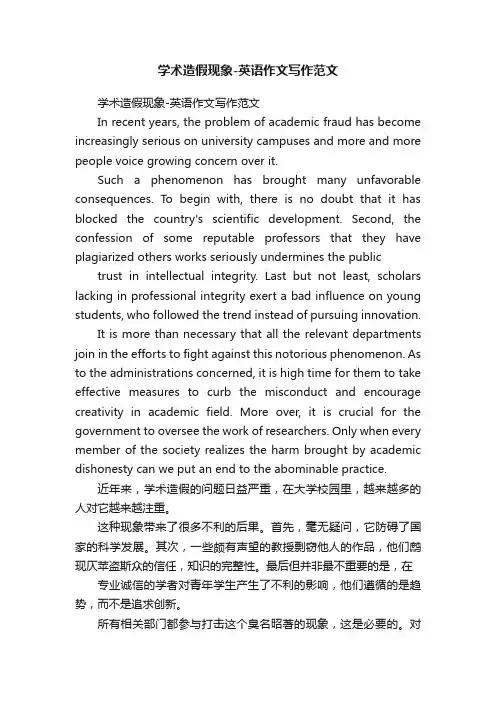
学术造假现象-英语作文写作范文学术造假现象-英语作文写作范文In recent years, the problem of academic fraud has become increasingly serious on university campuses and more and more people voice growing concern over it.Such a phenomenon has brought many unfavorable consequences. To begin with, there is no doubt that it has blocked the country's scientific development. Second, the confession of some reputable professors that they have plagiarized others works seriously undermines the public trust in intellectual integrity. Last but not least, scholars lacking in professional integrity exert a bad influence on young students, who followed the trend instead of pursuing innovation.It is more than necessary that all the relevant departments join in the efforts to fight against this notorious phenomenon. As to the administrations concerned, it is high time for them to take effective measures to curb the misconduct and encourage creativity in academic field. More over, it is crucial for the government to oversee the work of researchers. Only when every member of the society realizes the harm brought by academic dishonesty can we put an end to the abominable practice.近年来,学术造假的问题日益严重,在大学校园里,越来越多的人对它越来越注重。
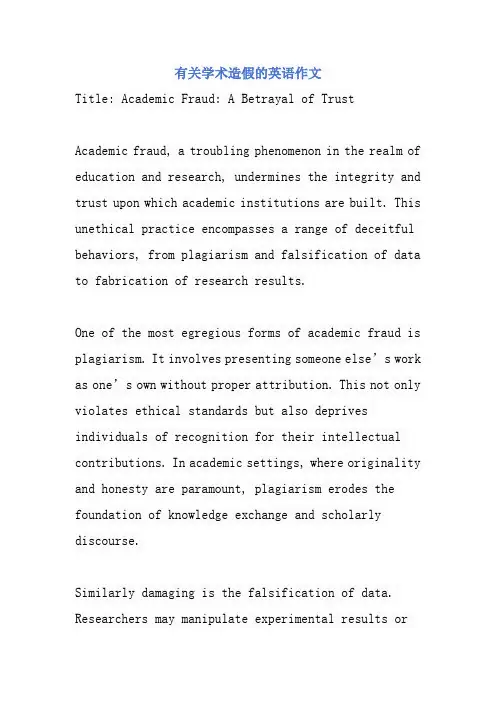
有关学术造假的英语作文Title: Academic Fraud: A Betrayal of TrustAcademic fraud, a troubling phenomenon in the realm of education and research, undermines the integrity and trust upon which academic institutions are built. This unethical practice encompasses a range of deceitful behaviors, from plagiarism and falsification of data to fabrication of research results.One of the most egregious forms of academic fraud is plagiarism. It involves presenting someone else’s work as one’s own without proper attribution. This not only violates ethical standards but also deprives individuals of recognition for their intellectual contributions. In academic settings, where originality and honesty are paramount, plagiarism erodes the foundation of knowledge exchange and scholarly discourse.Similarly damaging is the falsification of data. Researchers may manipulate experimental results orselectively report findings that support their hypotheses while disregarding contradictory evidence. Such practices distort scientific understanding and can have far-reaching consequences, potentially misleading other researchers and compromising the development of reliable knowledge.Fabrication of research results takes academic fraud to another level by inventing data or experiments entirely. This deception not only wastes valuable resources but also undermines public trust in scientific endeavors. The repercussions extend beyond academia, affecting policies, public health decisions, and technological advancements that rely on accurate and unbiased research outcomes.The implications of academic fraud are profound. Beyond the immediate impact on individuals and institutions, it erodes the public’s confidence in academic rigor and credibility. Moreover, it jeopardizes the careers and reputations of honest researchers and scholars who uphold ethical standards.Addressing academic fraud requires a multifaceted approach. Educational institutions must prioritize ethics education and promote a culture of academic integrity from an early stage. Clear guidelines and rigorous oversight mechanisms are essential to detect and deter fraudulent practices. Researchers themselves bear a responsibility to uphold honesty and transparency in their work, adhering to established codes of conduct and ethical guidelines.In conclusion, academic fraud is not merely a breach of rules but a betrayal of the fundamental principles that underpin scholarly pursuits. Upholding integrity in research and education is crucial for fostering a robust academic community built on trust, collaboration, and the pursuit of truth.。
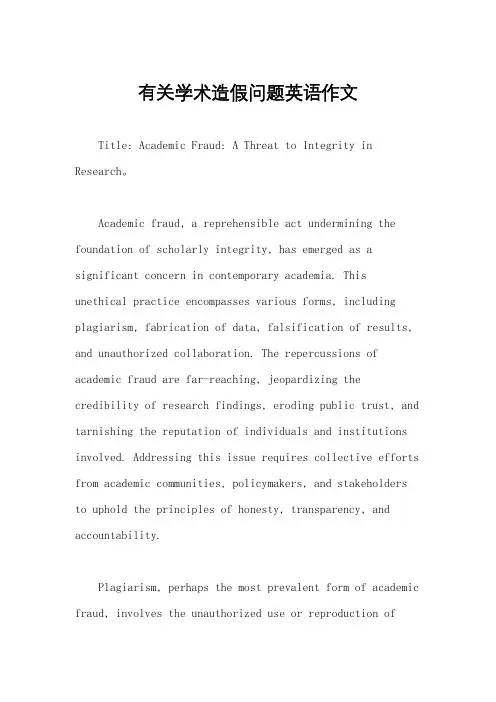
有关学术造假问题英语作文Title: Academic Fraud: A Threat to Integrity in Research。
Academic fraud, a reprehensible act undermining the foundation of scholarly integrity, has emerged as a significant concern in contemporary academia. This unethical practice encompasses various forms, including plagiarism, fabrication of data, falsification of results, and unauthorized collaboration. The repercussions of academic fraud are far-reaching, jeopardizing thecredibility of research findings, eroding public trust, and tarnishing the reputation of individuals and institutions involved. Addressing this issue requires collective efforts from academic communities, policymakers, and stakeholders to uphold the principles of honesty, transparency, and accountability.Plagiarism, perhaps the most prevalent form of academic fraud, involves the unauthorized use or reproduction ofsomeone else's work without proper acknowledgment. This unethical behavior not only violates intellectual property rights but also distorts the originality and authenticityof scholarly contributions. In an era characterized by the ease of accessing information online, the temptation to plagiarize has increased, posing a significant challenge to maintaining academic integrity. Educational institutions must implement stringent policies and utilize plagiarism detection software to deter and identify instances of plagiarism effectively.Fabrication and falsification of data represent another egregious form of academic fraud, where researchers manipulate experimental results or fabricate data to align with predetermined hypotheses. Such misconduct not only compromises the validity and reliability of scientific findings but also undermines the progress of knowledge and innovation. The pressure to publish in prestigious journals, secure funding, or advance one's academic career often exacerbates the temptation to engage in fraudulent practices. Therefore, fostering a culture that prioritizes the quality and rigor of research over quantitative metricsis essential in mitigating the prevalence of data fabrication and falsification.Unauthorized collaboration, including ghostwriting and guest authorship, is another insidious aspect of academic fraud that undermines the transparency and accountability of scholarly endeavors. Ghostwriting, where individuals contribute substantially to research but are not credited as authors, distorts the attribution of intellectual contributions and misrepresents the true extent of researchers' involvement. Similarly, guest authorship, whereby individuals are listed as authors withoutfulfilling substantive contributions, compromises the integrity of authorship and misleads readers about the credibility of the research. Academic journals and institutions must enforce strict guidelines for authorship attribution and disclose any potential conflicts of interest to ensure transparency and accountability in scholarly publications.The consequences of academic fraud extend beyond individual researchers to the broader scientific communityand society at large. Misleading or fabricated research findings can have detrimental effects on public health, policy decisions, and technological advancements. Instances of academic fraud erode public trust in science and academia, casting doubt on the credibility and reliability of research outcomes. Moreover, the reputational damage inflicted on institutions implicated in academic fraud can have long-lasting repercussions, affecting their credibility, funding opportunities, and academic standing.To combat academic fraud effectively, a multifaceted approach encompassing prevention, detection, and enforcement mechanisms is imperative. Educational institutions should prioritize education and awareness initiatives to instill ethical values and promote responsible conduct in research. Rigorous peer review processes and the adoption of robust research integrity policies can help identify and deter instances of academic fraud. Additionally, fostering a supportive and collaborative research culture that values transparency, reproducibility, and open communication is essential in fostering a climate conducive to upholding academicintegrity.In conclusion, academic fraud represents a pervasive threat to the integrity of scholarly research, undermining the credibility of academic institutions and eroding public trust in science. Addressing this issue requires concerted efforts from stakeholders across academia, including researchers, educators, publishers, and policymakers. By promoting ethical conduct, transparency, and accountability in research practices, we can safeguard the integrity of academic endeavors and uphold the principles of scholarly excellence. Only through collective action can we combat academic fraud and preserve the integrity and credibility of the scholarly enterprise.。
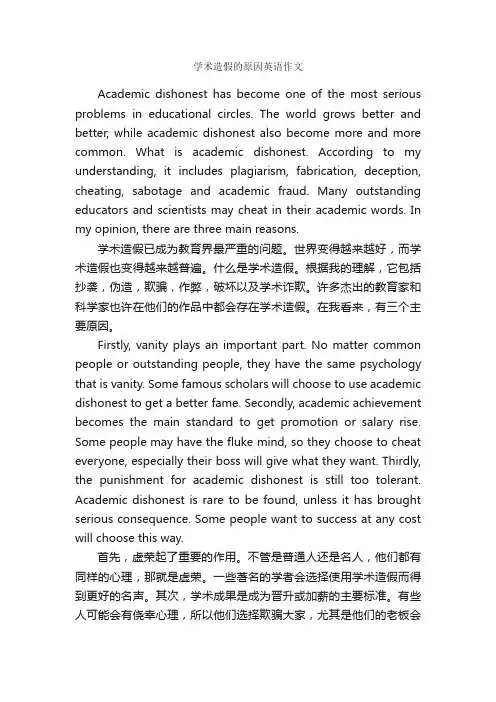
学术造假的原因英语作文Academic dishonest has become one of the most serious problems in educational circles. The world grows better and better, while academic dishonest also become more and more common. What is academic dishonest. According to my understanding, it includes plagiarism, fabrication, deception, cheating, sabotage and academic fraud. Many outstanding educators and scientists may cheat in their academic words. In my opinion, there are three main reasons.学术造假已成为教育界最严重的问题。
世界变得越来越好,而学术造假也变得越来越普遍。
什么是学术造假。
根据我的理解,它包括抄袭,伪造,欺骗,作弊,破坏以及学术诈欺。
许多杰出的教育家和科学家也许在他们的作品中都会存在学术造假。
在我看来,有三个主要原因。
Firstly, vanity plays an important part. No matter common people or outstanding people, they have the same psychology that is vanity. Some famous scholars will choose to use academic dishonest to get a better fame. Secondly, academic achievement becomes the main standard to get promotion or salary rise. Some people may have the fluke mind, so they choose to cheat everyone, especially their boss will give what they want. Thirdly, the punishment for academic dishonest is still too tolerant. Academic dishonest is rare to be found, unless it has brought serious consequence. Some people want to success at any cost will choose this way.首先,虚荣起了重要的作用。
校园学术造假英文作文英文:Academic fraud has become a serious problem on campus.It not only undermines the credibility of academic research, but also affects the fairness of academic competition. As a student, I have witnessed some cases of academic fraud on campus.One common form of academic fraud is plagiarism. Some students copy and paste others' works without attribution, which is a violation of academic integrity. For example, a classmate of mine once submitted a paper that was almost identical to an article published in a journal. When the professor found out, he gave her a failing grade and warned the whole class about the consequences of plagiarism.Another form of academic fraud is fabrication. Some students make up data or results to support their hypotheses, which is a serious violation of scientificethics. For instance, a friend of mine once conducted a survey on campus, but she didn't get enough responses to support her argument. So she made up some data to fill the gap. When the professor found out, he not only gave her a failing grade, but also reported her to the academic integrity office.To prevent academic fraud, I think we need to raise students' awareness of academic integrity and provide them with more guidance on how to avoid plagiarism and fabrication. For example, professors can teach students how to properly cite sources and how to conduct research ethically. Moreover, universities can establish a strict system of academic integrity and impose severe punishments on those who violate it.中文:学术造假已经成为校园中的一个严重问题。
英文作文关于学术造假英文:Academic fraud has become a serious problem in today's society. As a student, I have witnessed many cases of academic fraud, such as plagiarism and falsification of research data. Academic fraud not only undermines the integrity of academic research but also damages the reputation of institutions and individuals involved.Plagiarism is one of the most common forms of academic fraud. It is the act of using someone else's work without giving proper credit. I have seen many students copy and paste information from the internet without citing the source, which is a clear violation of academic integrity. Falsification of research data is another form of academic fraud. It involves manipulating or fabricating data to obtain desired results. This not only undermines the credibility of research but also puts people's lives at risk.Academic fraud has severe consequences. It can lead to the loss of academic degrees, suspension or expulsion from school, and even legal action. In addition to the personal consequences, academic fraud also damages the reputation of institutions and individuals involved. It undermines the credibility of academic research and can lead to a loss of funding and support.To prevent academic fraud, institutions must takestrict measures to ensure academic integrity. This includes educating students about the importance of academic integrity, implementing plagiarism detection software, and conducting thorough investigations into suspected cases of academic fraud. Students must also take responsibility for their actions and understand the consequences of academic fraud.In conclusion, academic fraud is a serious problem that undermines the integrity of academic research and damages the reputation of individuals and institutions. It is important for students and institutions alike to takeresponsibility for maintaining academic integrity and preventing academic fraud.中文:学术造假已成为当今社会的严重问题。
学生学术造假英语作文English:Academic dishonesty, including plagiarism and fabrication of data, is a serious issue that undermines the integrity of the educational system. When students engage in academic dishonesty, they are not only cheating themselves out of a true learning experience, but they are also devaluing the hard work and efforts of their peers. Additionally, it creates an unfair advantage for those who are willing to cheat, which is ultimately unjust to those who choose to uphold academic integrity. It is important for educators to emphasize the importance of honesty and to instill within their students a strong sense of ethics and integrity. Furthermore, measures should be put in place to detect and deter academic dishonesty, such as using plagiarism detection software and implementing clear consequences for those who are caught engaging in such behavior. By addressing academic dishonesty at its core, we can foster an educational environment that is built on trust, honesty, and the pursuit of genuine knowledge.中文翻译:学术诚信问题,包括抄袭和捏造数据,是一个严重的问题,它破坏了教育体系的诚信。
学术造假英文作文模板英文:Academic fraud is a serious problem that has plagued the academic world for years. It is a form of cheating that involves falsifying research data, plagiarism, or fabricating results to achieve desired outcomes. Academic fraud not only undermines the integrity of academic research, but it also harms the reputation of the individuals involved and the institutions they represent.One of the most common forms of academic fraud is plagiarism. This occurs when a researcher presents someone else's work as their own, without giving proper credit. Plagiarism can be intentional or unintentional, but either way, it is a serious offense that can result in severe consequences. For example, a student who plagiarizes a paper may receive a failing grade or even be expelled from school.Another form of academic fraud is falsifying data. This occurs when a researcher fabricates or manipulates data to support their hypothesis or desired outcome. Falsifying data is a serious offense because it undermines thevalidity of the research and can lead to incorrect conclusions. For example, a scientist who falsifies data in a clinical trial could put patients at risk by recommending an ineffective or even harmful treatment.In addition to plagiarism and falsifying data, academic fraud can also take the form of ghostwriting, where a researcher hires someone else to write their paper or article, or self-plagiarism, where a researcher reusestheir own work without proper citation. All of these forms of academic fraud are unethical and can have serious consequences.中文:学术造假是一个严重的问题,多年来一直困扰着学术界。
学术造假英文作文英文:Academic fraud is a serious issue that has been a hot topic in recent years. It refers to the act of falsifying research data, plagiarism, or other unethical practices in academic work. This problem not only undermines theintegrity of the academic community but also has a negative impact on the progress of science and the reputation of the individuals involved.One of the most common forms of academic fraud is plagiarism, which involves using someone else's work without proper citation. I remember a case in my university where a student was caught plagiarizing a significant portion of their thesis. This not only led to the student being expelled from the university but also tarnished their reputation as a scholar. It's a shame that some people resort to such dishonest practices in order to achieve success.Another example of academic fraud is the fabrication of research data. This can have serious consequences, as it can lead to false conclusions being drawn and can mislead other researchers in the field. I recall reading about a high-profile case where a prominent scientist was found to have fabricated data in their research, which had a significant impact on the scientific community. This not only damaged the reputation of the individual but also cast doubt on the validity of their entire body of work.中文:学术造假是近年来热议的严重问题。
学术作假英文作文英文,Academic fraud is a serious issue that affectsthe integrity of the academic community. It is a problemthat occurs when individuals falsify their research findings, plagiarize the work of others, or fabricate datain order to gain an unfair advantage. This type of behavior not only undermines the credibility of the individual, but also damages the reputation of the academic institution and the academic community as a whole.One common form of academic fraud is plagiarism, where individuals copy the work of others and present it as their own. This can occur in written assignments, research papers, and even in published articles. I remember a classmate in college who was caught plagiarizing a research paper. Hehad copied large portions of the paper from an onlinesource without properly citing the original author. As a result, he received a failing grade on the assignment and was subject to disciplinary action by the university.Another form of academic fraud is falsifying research findings. This can include manipulating data, fabricating results, or even inventing research findings altogether. I once read about a high-profile case where a well-known scientist was found to have falsified the results of his research in order to secure funding for his laboratory. This not only damaged his own reputation, but also had a negative impact on the field of science as a whole.In addition to plagiarism and falsifying research findings, academic fraud can also involve cheating on exams and other assessments. I have heard of students using cheat sheets, communicating with others during exams, and even hiring someone else to take exams for them. These actions not only undermine the fairness of the assessment process, but also devalue the efforts of those who have studied and prepared honestly.中文,学术作假是一个严重的问题,它影响了学术界的诚信。
2020年大学英语六级作文范文:学术造假现象
题目要求:学术造假现象
1.近年来学术造假现象越来越普遍
2.学术造假现象造成的影响
3.我的观点
参考范文:On Academic Honesty
In recent years, the problem of academic fraud has become increasingly serious on university campuses and more and more people voice growing concern over it.
Such a phenomenon has brought many unfavorable consequences. To begin with, there is no doubt that it has blocked the country's scientific development. Second, the confession of some reputable professors that they have plagiarized others works seriously undermines the public
trust in intellectual integrity. Last but not least, scholars lacking in professional integrity exert a bad influence on young students, who followed the trend instead of pursuing innovation.
It is more than necessary that all the relevant departments join in the efforts to fight against this notorious phenomenon. As to the administrations concerned, it is high time for them to take effective measures to curb the misconduct and encourage creativity in academic field. More over, it is crucial for the government to oversee the work of researchers. Only when every member of the society realizes
the harm brought by academic dishonesty can we put an end to the abominable practice.
亮点词汇
①blockv.防碍
②confessionn.承认,坦白
③plagiarizev.抄袭,剽窃
④underminev.破坏,损害
⑤exert a bad influence on对……造成不好的影响
⑥overseev.监管
⑦abominablea.令人憎恶的,恶劣的。